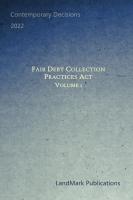Description
* * *
Congress enacted the FDCPA in 1977 "to eliminate abusive debt collection practices by debt collectors" and "to insure that those debt collectors who refrain from using abusive debt collection practices are not competitively disadvantaged." 15 U.S.C. § 1692(e). It provides a private right of action against debt collectors who violate its provisions. 15 U.S.C. § 1692k; see also Brown v. Card Serv. Ctr., 464 F.3d 450, 453 (3d Cir. 2006). "As remedial legislation, the FDCPA must be broadly construed in order to give full effect to these purposes." Caprio v. Healthcare Revenue Recovery Grp., LLC, 709 F.3d 142, 148 (3d Cir. 2013).
"To prevail on an FDCPA claim, a plaintiff must prove that (1) she is a consumer, (2) the defendant is a debt collector, (3) the defendant's challenged practice involves an attempt to collect a 'debt' as the [FDCPA] defines it, and (4) the defendant has violated a provision of the FDCPA in attempting to collect the debt." St. Pierre v. Retrieval-Masters Creditors Bureau, Inc., 898 F.3d 351, 358 (3d Cir. 2018) (quoting Douglass v. Convergent Outsourcing, 765 F.3d 299, 303 (3d Cir. 2014)). [. . .]
[T]he statute defines "debt collector" as any person (1) "who uses any instrumentality of interstate commerce or the mails in any business the principal purpose of which is the collection of any debts" (the "principal purpose" definition), or (2) "who regularly collects or attempts to collect, directly or indirectly, debts owed or due or asserted to be owed or due another" (the "regularly collects" definition). 15 U.S.C. § 1692a(6). The statute thus provides two separate paths to establishing an entity's status as a "debt collector." See Henson, 137 S.Ct. at 1721.
Barbato v. Greystone Alliance, LLC, 916 F. 3d 260 (3rd Cir. 2019)
Product Details
- Feb 23, 2022 Pub Date:
- 9798421451419 ISBN-10:
- 9798421451419 ISBN-13:
- English Language




